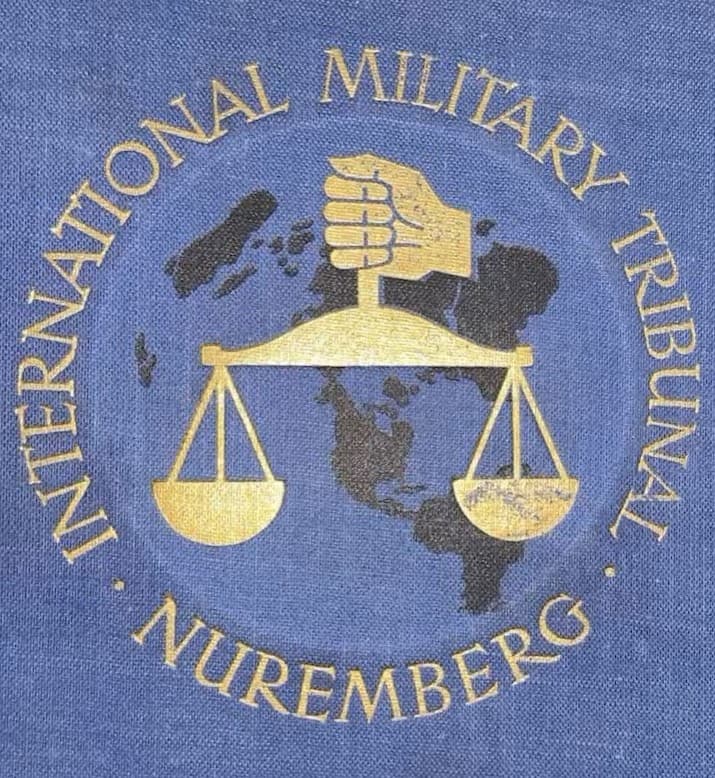Plot or desperation seen in Nazi request for Allied witnesses
War criminals can’t gain much but could sow disunity with claims about Russia
By Carl D. Groat, Scripps-Howard staff writer
NUERNBERG, Germany (SHS) – Is it a Nazi plot, or is it simply desperation that prompts the request of Joachim von Ribbentrop and Rudolf Hess that prominent Britons and Americans be summoned as defense witnesses in their trial here?
Failure of the move as a help to the defendants is foreseen.
If the request for foreign witnesses is a plot, its purpose could be to sow differences or embarrassment among the Allies.
For instance, should testimony indicate that some Britons and Americans welcomes Germany’s role as a barrier or destroyer of Russia, that might abrade Russian feelings. A mere launching of the idea already has stirred Britons to resist the summonses as incompatible to British interests.
Must prove relevancy
Before the tribunal agrees to such a program, however, the defendants must prove the relevancy of their anticipated testimony.
Dinner-table gossip of the Cliveden Set in England is scarcely ground for Germany’s aggressive warfare.
Some persons’ advocacy of Germany as a barrier to Russia wouldn’t condone the atrocities and inhumanities the Nazis perpetrated. One German counsel told the writer that the claim of self-defense is scarcely foreseeable. Any attempt by Ribbentrop to clear his skirts by claiming he wanted Anglo-American rapprochement likewise offers no excuse for Germany’s deeds.
Weakest cases
Meanwhile, it was learned that perhaps the weakest cases are against Adm. Karl Doenitz and Jew-baiter Julius Streicher.
Streicher obviously is an extremely foul person with his pornographic anti-Semitic paper, Der Stuermer, but compared with the others he is described as small potatoes.
Doenitz is seen as conceivably able to prove that he was not a top conspirator but largely an administrator of strictly naval policies.
General’s defense
The lawyer for Field Marshal Wilhelm Keitel told this writer that he will claim that at least prior to 1938 Keitel was merely executing an expansion program that envisaged an armed force even smaller than the then existing neighboring forces.
He contends obedience is ingrained in Germans, hence top commanders necessarily must heed state orders and shouldn’t be held accountable for misdeeds far down in ranks.
Incidentally, lay observers might be surprised at the sympathy Allied military officials have for the theme that commanders shouldn’t be held responsible for military acts which they perforce are pledged to perform.
Forestalls claims
Defense lawyers also plan to reiterate the earlier claim that the court lacks jurisdiction. The speech of the American prosecutor, Justice Robert H. Jackson, took pains to forestall such claims.
It is understood that Justice Jackson will rely considerably on the thesis that Germany pledged in the Kellogg and other pacts to avoid war. Justice Jackson and his colleagues seem anxious to satisfy the world of the fairness of their procedure, without legalistic pinpricking.
If the world approves what is done here, they’ll think the grueling job has been worthwhile particularly if it sets a yardstick to scare off aggressors from a future war.
The Evening Star (November 26, 1945)

ON THE RECORD —
The opening of the War Crimes Tribunal
By Dorothy Thompson
Justice Jackson’s opening of the prosecution, before the War Crimes Tribunal, is on a high level of pleading. He is aware that “unfortunately” the “nature of the crimes is such that prosecution and judgment must be by victors over vanquished.” The prosecution is ex post facto – the accused being tried for what was dubiously illegal in international law when committed.
But Justice Jackson bases his case on natural law, and the state of public consciousness and conscience. Much law has been judge-made. The conscience of mankind is against aggressive war. This universal sense that aggressive war is a crime must, he argues, become law by establishing the precedent that individuals who conspire and assist to make it shall be held personally responsible.
“Only persons commit crimes.” Justice Jackson elevates his case by saying, “While this law is first applied against German aggressors, the law includes, and… must condemn aggression by any other nation, including those who sit in judgment.”

I am not impressed in this case by arguments against ex post facto law. Sometime, somewhere, a supreme tribunal must fix responsibility for acts committed in the name of states that were they private would send any man to the gallows. It is precisely because these trials should create a new law for the conduct of nations that it is of supreme importance that they be conducted with the most exact justice. There is, therefore, a dismaying paragraph in Justice Jackson’s indictment:
“If these defendants should succeed for any reason in escaping the condemnation of this tribunal… those who are American-held prisoners will be delivered up to our continental Allies.”
This is judgment in advance of the hearing. It throws doubt on the jurisdiction of the tribunal itself. In the dock sit heterogeneous individuals, separately charged, and with various degrees of innocence or guilt. Anglo-Saxon justice is based on the assumption that every man is innocent until proved guilty, and no state based on law condemns the accused in advance of trial. Revolutionary “people’s tribunals” do, but civilized men recognize this as “lynch law.”
What Justice Jackson says in effect is: If this jury, which is also prosecutor, fails to support its own case we will deliver these men to others who will condemn them. In that single paragraph, Justice Jackson undoes his argument, “That four great nations flushed with victory and stung with injury… voluntarily submit their captive enemies to the judgment of law is one of the most magnificent tributes that power ever has paid to reason.”

One of the most impressive parts of Justice Jackson’s indictment deals with crimes against humanity – forced labor, systematic extermination of races, and subjection of established human and legal rights to the single criterion of the Nazi program. Justice Jackson includes among the victims the German people themselves.
But the weakness in this part of the indictment is that the crimes are indicated only as a feature of aggressive war.
Actually, they were not committed for the purposes of war, but as part of the German “revolution.” Had the Nazis never gone to war, they would have exterminated the Jews. And had they successfully spread the Nazi revolution outside their borders, they would not have needed war.
These persons stand accused of the attack on Austria. But the Austrian government was overthrown by fifth columnists who established a “friendly government” which invited in the German troops. This “friendly government” then put into practice the Nazi program of extermination of dissenters.
If these trials condemn only crimes against humanity committed in the prosecution of aggressive war between nations, they will offer no future guarantee against such crimes. If the ears of the judges are sensitively attuned, they may hear the cries of suffering humanity from all quarters of the globe, and from countless graves into which men have been shoveled, not only because they were racial inferiors, but because they were bourgeois, or Trotskyists, or ideological deviationists or – at present – merely German.
The worst crimes against humanity, exactly those of which the accused are indicted, have been committed in civil wars and revolutions, domestically or externally fomented, that is how this war began – and in the future aggression in the usual sense may never occur, but only armed interventionism for or against revolutions within nations.
Thus, even if aggressive international war is established as criminal, revolutions which “make their own law” in the bloodbaths of their opponents, will still commit atrocious crimes against humanity.













